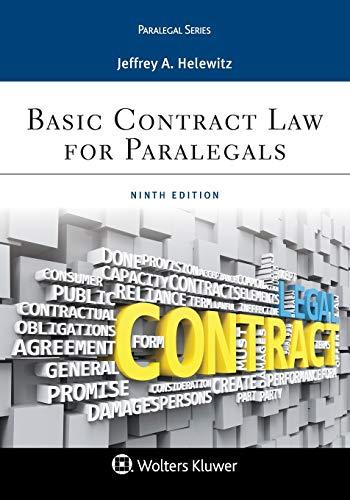The plaintiff, Massachusetts Eye & Ear Infirmary (MEEI), brings an action against the Eugene B. Casey Foundation
Question:
The plaintiff, Massachusetts Eye & Ear Infirmary (“MEEI”), brings an action against the Eugene
B. Casey Foundation (“the Foundation”) and Thomas
F. Reilly (“Reilly”), the Attorney General of Massachusetts, seeking a declaratory judgment and damages arising out of an alleged contract dispute with the Foundation. The Foundation moves to dismiss pursuant to Fed. R.
Civ. P. 12(b)(6) for failure to state a claim. Having reviewed the memoranda in support of and opposition to the motion, the Court resolves it as follows.
II. Factual Background According to the complaint, on or about November 27, 2002, the Foundation and MEEI entered into a contract whereby the Foundation promised to make a substantial gift to MEEI in seven installments totaling $ 2 million to be used in connection with MEEI’s Voice Restoration Research Program. MEEI understood the agreement to be that the gifts were to be used solely in support of voice restoration research. At the time of the donation, MEEI’s voice restoration program was under the direction of Dr. Steven Zeitels, one of the nation’s leading laryngologists, but MEEI insists that the gift was not conditioned on Dr. Zeitels’s continued employment.
On May 12, 2004, Dr. Zeitels informed MEEI that he would resign effective June 30, 2004. On June 8, 2004, the Foundation informed MEEI that it would no longer support MEEI’s voice restoration program in the absence of Dr. Zeitels. MEEI alleges that the Foundation
1) demanded the return of the portion of its gift previously submitted but not already expended (approximately $1 million) and
2) refused to make the gifts promised in the remaining installments (an additional $1 million). MEEI insists that its voice restoration studies will continue with a different research team.
MEEI seeks
1) a declaratory judgment that MEEI may retain the money it has already received and
2) damages for breach of contract for the Foundation’s failure to pay the remainder of the promised gift.
The Foundation denies all material elements of the claims and offers 11 affirmative defenses, including an assertion that the gift is unenforceable for failure of consideration and because MEEI has not performed as promised.
The Foundation also asserts that MEEI has failed to state a claim upon which relief can be granted.
The Foundation has filed counterclaims against MEEI, alleging that it is entitled to the return of the portion of the prior donations not yet expended by MEEI on the Voice Restoration Research Program. The Foundation alleges that
1) the gift was directly tied to the Voice Restoration Research Program and, more specifically, to Dr. Zeitels’s direction of the Program and
2) when Dr. Zeitels left MEEI, the Voice Restoration Research Program ceased to exist and the “trust” in which the monies were held by MEEI, failed. As a result of that failure, the Foundation contends that it is entitled to a refund of the money not yet expended on voice restoration research and to a release from any further obligation to make additional gifts. The Foundation counterclaims for
1) a return of the unexpended funds on the theory that when Dr. Zeitels resigned, the purpose of the donation failed and a resulting trust was created,
2) an accounting of the funds already donated,
3) imposition of a constructive trust on interest earned on the money held by MEEI and
4) conversion. MEEI’s answer to the counterclaims denies all material elements and asserts six affirmative defenses, including failure to state a claim........
Questions
1. What does the court say about consideration and a charitable pledge?
2. How does the court deal with the concept of reliance to decide the issue?
3 . Why does the court deny the damages request?
Step by Step Answer:






